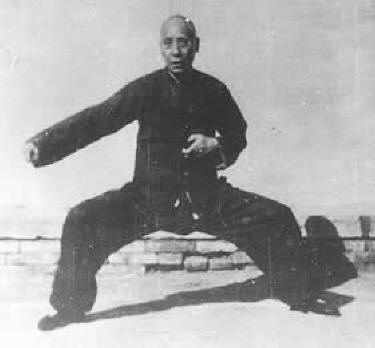Two instances of orthographic ambiguity: GODISNOWHERE and Chen Fake
« previous post | next post »
From Michael Carr:
The devil's in the kerning.
And here's Chen Fake:

The source of the "fake" name:
Chen Fake 陳發科 (1887-1957), a Chinese martial artist who taught Chen-style tai chi.
We've encountered such Chinese "fake" expressions before:
- "258 FAKE " (4/30/14) — that's the street address of the artist Ai Weiwei in Beijing.
- "Franco-Croatian Squid in pepper sauce " (3/12/09) — fǎkè yóu 法克鱿

Bill Black said,
November 23, 2017 @ 10:50 pm
I'm fairly sure the ambiguity in the church sign is intentional, even koan-like. There's a radical Christian philosopher named Peter Rollins who's become fairly influential in some progressive Christian circles. (I see he's been a guest speaker at First Baptist Church in Newton, Massachusetts, which I should note is not at all affiliated with the Southern Baptist Convention: http://radiant.fbcnewton.org/PDFs/Peter%20Rollins%20Flyer.pdf) And in his book "The Fidelity of God: Towards a Church Beyond Belief" (Paraclete Press, 2008), Rollins writes the following on God's simultaneous immanence and transcendence:
"Because of the utterly immanent nature of this transcendent birth, all reflection fails to grasp it. In Christianity we call the source of this conversion 'God,' but the moment we turn toward this source as an object, as an 'it,' we lose sight of that source. This can be expressed in the ambiguity found in the letters G-O-D-I-S-N-O-W-H-E-R-E. Placed together they can be read either as 'GOD/IS/NOW/HERE' or as 'GOD/IS/NOWHERE.' One could say that these letters capture something about the view of God housed within so much of the Judeo-Christian tradition, a tradition that affirms a presence that is absent, dwelling deeply in the 'now here' and yet experienced or understood as 'nowhere.'" (118–19)
CZEdwards said,
November 23, 2017 @ 11:14 pm
The upper are missionaries who think they’re clever. They like to set up at street fairs and get into arguments with anyone who doesn’t fall into their narrow definitions of evangelical, Protestant Calvinism. As a general warning… if one wants an argument, they’ll provide, but it’s much like playing chess with a pigeon. I’ve watched a Jesuit, an atheist Doctor of rhetoric, and a Soto Zen Buddhist master all realize the time they spent in a circular argument are thirty minutes they’ll never get back.
AntC said,
November 24, 2017 @ 1:07 am
… all reflection fails to grasp it. In Christianity we call the source of this conversion 'God,' but the moment we turn toward this source as an object, as an 'it,' we lose sight of that source. … a presence that is absent, …
Sounds like straight out of Kant to me; or Spinoza; or Leibniz. Are you sure this lot are even theists? More to the point, are they sure?
Joon said,
November 24, 2017 @ 5:20 am
Yes, they are. They're part of a tradition of apophatic theology which has among the greatest Christian theologians and philosophers among its ranks.
Larry Davidson said,
November 24, 2017 @ 6:58 am
Yes, the ambiguity is intentional:
http://www.fbcnewton.org/blog/good-friday-and-the-sign
RP said,
November 24, 2017 @ 12:44 pm
There's also "God:/I/snow/here".
Sili said,
November 24, 2017 @ 5:32 pm
Bart Ehrmann uses GODISNOWHERE in his books to illustrate the difficulty in reading New Testament texts in the oldest copies.
peterv said,
November 25, 2017 @ 3:30 am
@CZEdwards wrote:
”I’ve watched a Jesuit, an atheist Doctor of rhetoric, and a Soto Zen Buddhist master all realize the time they spent in a circular argument are thirty minutes they’ll never get back.”
I have to say, I find this unlikely. Jesuits are renowned for their love of debate and disputation, to the extent that they’ve even given their name to an adjective that describes a form of argument. Presumably, doctors of rhetoric are similarly inclined, even if nonbelievers. And no true Zen Buddhist would understand the notion of “wasted” time: preferring one use of time over some other use is a form of attachment Zen adherents would try to avoid.
peterv said,
November 25, 2017 @ 3:30 am
@CZEdwards wrote:
”I’ve watched a Jesuit, an atheist Doctor of rhetoric, and a Soto Zen Buddhist master all realize the time they spent in a circular argument are thirty minutes they’ll never get back.”
I have to say, I find this unlikely. Jesuits are renowned for their love of debate and disputation, to the extent that they’ve even given their name to an adjective that describes a form of argument. Presumably, doctors of rhetoric are similarly inclined, even if nonbelievers. And no true Zen Buddhist would understand the notion of “wasted” time: preferring one use of time over some other use is a form of attachment Zen adherents would try to avoid.